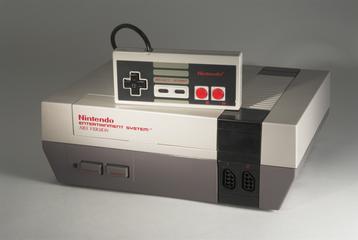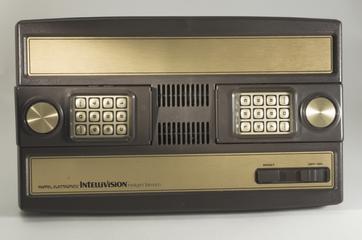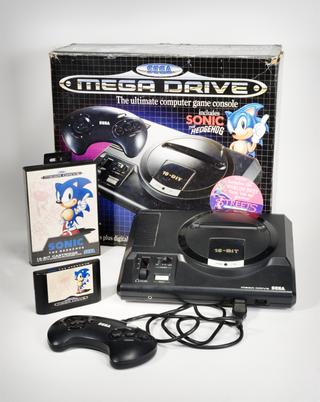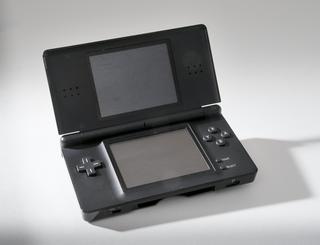




























The C64 Mini games console with 64 pre-installed games, with USB joystick, HDMI cable and USB power lead, developed by Retro Games Ltd. and distributed by Koch Media, made in China, 2018.
Developed by Retro Games Ltd. the C64Mini is a retro games console based on the iconic Commodore 64 microcomputer, originally released in January 1982. The console is powered via a micro-USB, connected to a TV screen via a HDMI cable and a joystick is used to navigate the interface. They run off an ARM CPU and Linux operating system running the VICE emulator, an emulator for the Commodore 8-bit computer range. Apart from the start button none of the keys work on the C64Mini. This this is not the case on the newer model, C64 a full-sized version, which was released in December 2019 with a fully functioning keyboard and improved joystick and increased price, £110 up from £35. Both contain 64 preloaded Commodore games, which are displayed on a carrousel with their title, the original box art and a blurb about the game.
Mini and retro consoles are a subset of retrograming, a modern trend in digital gaming which exists alongside online and mobile games. Retrogaming refers to the practice of playing and collecting original video and computers games from the 1970s to the early 1990s or using emulators to play them. It has also been defined as a more general cultural form, consisting not only of games and devices but other activities, such as the production of a broad range of consumer products, clothes, accessories, game related music videos, etc. Although retrogaming is not new in the last twenty years has become commercialised, shifting from small groups of hobby enthusiasts to a mainstream audience.
Video games are an important part of generational identity and nostalgia plays a big part in the popularity of mini consoles. There has been a revival of gaming arcades in the US and Japan with steady but slower rates in the UK. Although the C64Mini was not released to a specific market, the main customers have been, as the developers expected, prior owners of the Commodore 64 who had the console in the 1980s. There is evidence that parents and carers are buying them to play with their children establishing cross-generational links. Retro Games have received reports that batches have been bought in Germany and Australia to teach basic coding to children in schools and clubs.
Nintendo established a new marketplace for retro games by introducing a library of downloadable games through a service called ‘Virtual Console’ in 2006. The platform reportedly sold over ten million downloads in its first few months. Nintendo further capitalised on this nostalgia and started the trend for mini consoles by releasing the Mini NES in 2016 which sold out immediately and prompted the released of the super NES Classic which remains a bestseller. Now there are retro consoles from all major game manufactures; SEGA, PlayStation and GameBoy.
All mini consoles come with built in games, ranging from 21 in the case of the Super NES classic, to 120 in the Atari Flashback. However, unlike the C64mini the player is unable to add extra games to most of these devices. For some developers the renewed interest in retrogaming represents a devolution in gaming with people choosing to play less sophisticated games and platforms over model games using the most advanced technology and playing experience. Such a preference is at odds with the traditional push towards better graphics and faster hardware.
The emulators at the heart of these consoles were often built, maintained and updated by enthusiasts (as open source software) to share their love of gaming by porting the old technology to new machines. This was often necessary as older hardware and games (on cartridges and tapes) became harder to source. As such, the practice of sharing games as ROMs became fairly widespread. In recent times the games manufacturers have put the sharing of ROMs under anti-piracy scruitiny and the introduction of these new retro gaming machines and online stores could be considered a way to strengthen that argument, now giving an official source to which games can be obtained.
Details
- Category:
- Games Technology
- Object Number:
- 2020-250
- Materials:
- metal (unknown) and plastic (unidentified)
- Measurements:
-
Console: 41 mm x 202 mm x 104 mm, .372 kg
Boxed: 102 mm x 365 mm x 143 mm,
- type:
- video games
- credit:
- Retro Games Ltd.




